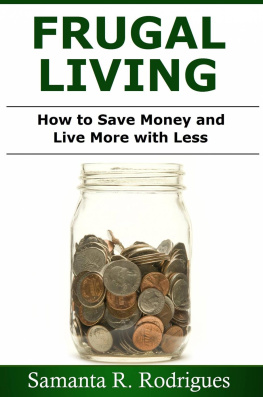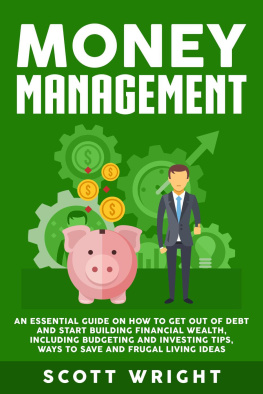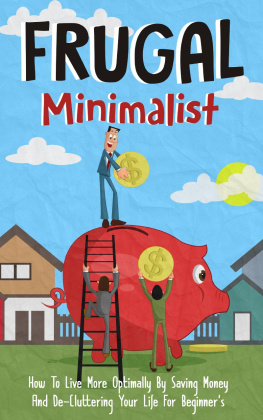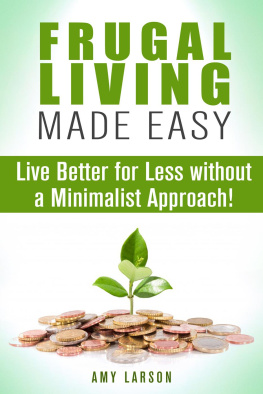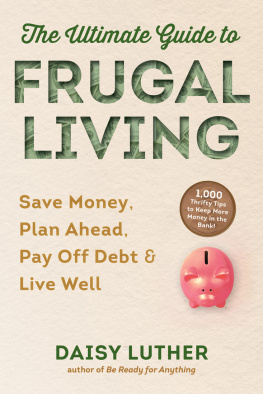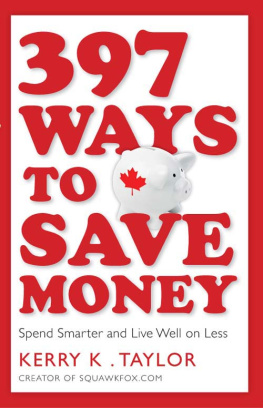Frugal Living: How to save money and live more with less
Samanta R. Rodrigues
Translated by Cipriana Leme
Frugal Living: How to save money and live more with less
Written By Samanta R. Rodrigues
Copyright 2016 Samanta R. Rodrigues
All rights reserved
Distributed by Babelcube, Inc.
www.babelcube.com
Translated by Cipriana Leme
Babelcube Books and Babelcube are trademarks of Babelcube Inc.
NOTICE
The following content reflects the opinion of the author and should not be considered a guideline by the reader, who may or may not follow the advice or information at their own risk and discretion.
Always seek expert professional advice before making any financial decisions.
The trademarks and websites mentioned in the text are the property of their respective owners. The author and editor did not receive any payment for mentioning these trademarks and websites in this text.
Introduction
A dvice on how to save money abounds. It can be simple advice, such as switching off the lights when leaving a room, or less common advice, such as milling your own flour. On the internet, there are forums where, if you know how to search for the right information, you can even learn how to channel rain water for your vegetable patch or washing machine. Or how to stock (really necessary) items that are on sale or special offers.

O bviously, a frugal lifestyle suggests a specific mindset: you must constantly ask yourself whether you need something before purchasing it. You have to preserve what you already have. You must manage your resources - your time, your money and your energy.
In addition to ourselves, we must also think about our family members. Each family has a certain level of financial comfort and its own goals. In this book, we will assume that the reader is a member of the global middle class.
By the end of this book, the expectation is that you will always have more - even if that means momentarily living with less. This is not as easy as it sounds. In todays society, the pressure to purchase is huge. During lean periods, frugality stops being an option and starts to become a necessity.
A frugal lifestyle does not mean you will spend hours looking for special offers on the internet. In fact, frugality teaches us when to spend money on expensive things and when to look for bargains.
Yes, you can grow your own vegetable garden and raise chickens, even if its only on the balcony of your apartment. But that is not what frugal living is all about.
I hope you can benefit from all the advice contained in this book. Good luck!
***
Tips for a frugal life
T his chapter provides some valuable tips for anyone who wants (or needs) to adopt a frugal lifestyle.

B uy durable items
The logical assumption is not to use shoes until they have holes in the soles. But, if you buy good brands, your shoes will last longer. It is important to check the quality of clothing items, and table, bed and kitchen linen. Searching for the brand or shop where you plan on making your purchase is also worthwhile. You will be amazed at how much you can learn. The most expensive items are not always the best or most durable items.
You should only buy durable goods that you really need. There is no point buying an expensive digital camera if you are only going to take pictures once in a while; use the camera on your mobile phone instead.
O nly buy what you need, when you need it
Stocking food can sound like a great plan, but how much rotten food will you have to throw away? Plan a weekly menu and only buy the absolutely necessary to prepare the meals on your menu. Avoid buying expensive savory snacks and treats.
Buy fruit and vegetables
The fresher the food, the better it will taste. And fruit and vegetables are not as expensive as you might think, depending on where you buy them. Make the extra effort and choose the best fresh fruit and vegetables to take home.
Eat less
Yes, I know it sounds silly to say this. Think about it: why eat two sandwiches when one is quite enough? Why eat two fruits, when one is a good enough dessert?
Avoid eating while watching television since according to research we tend to eat more when sitting in front of the television.
Join giveaway groups
Detachment groups appear on the internet once in a while. In these groups, people exchange or give things away to whoever is willing to have them. Find these groups and take advantage of the things people are giving away.
Calculate transport
Your favorite shop has several items on sale. The overcoat youve always wanted dropped from 200 to 150. Theres only one problem: The shop is 100 km away. You dont want to get public transportation; you want to go by car. Wait a second. How much will the trip cost?
Write everything down and you will see that it is not always worth the trip just to take advantage of a special offer.
I f possible, walk or use your bike
I know this is not always possible. Sometimes the destination is too far and you cannot walk or ride your bike there. Other times it might even be possible to bike it, but you run a serious risk of getting run over, especially if you city does not have bike lanes.
Unplug your devices
Unplug your devices and electronics when you are not using them. This will help you save on the light bill since devices on standby still consume electricity. Take the microwave oven: it is always ready for use, but you only use it once in a while. There is really no point wasting money just to see your electronics with the little red light on.
In some countries with less than ideal power grids, electronics technicians are often telling users to unplug the washing machine. This habit is not only about saving a few bucks on the light bill; it also means we are extending the working life of our devices.
Try other brands
Why must we always use the traditional brands? Maybe the supermarket brand can also meet your needs and cost less than the similar, more popular brand.
In addition to testing new brands, you can replace products. Replace clothes softener with white alcohol vinegar. Its not only cheaper, but more natural, too. You never really know how many chemicals are in those industrialized products anyway!
Study financing options
If you need to buy more expensive items - a car or a house, for example - and you need a loan, study all the options and calculate the results. Search the internet for all the rates you will have to pay when requesting a loan.
Its not only the interest rates you have to worry about. You also have to consider monetary restatement, charges for opening credit, notary fees, tax (in case of property, the property transfer tax at the moment of purchase and the property tax every year), and other costs.
Before requesting a 30-year property loan, think about your work situation: do you have stable employment? For long-term financial commitments, we need minimal financial predictability, considering that a lot can happen in 20 or 30 years.
Discover your expenses
Budgeting is a basic concept in any personal accounts book. Find out where your money is going. Write down your expenses, even the smallest ones. Figure out how much you spend at the salon, at the cinema, at restaurants, etc. Identify what is draining your finances.
Some say it does not matter how much you earn, but how much you spend. There is some truth in these words. Although, in my opinion, how much you earn is important and how much you spend is equally important. If you make 20 thousand a month and spend 25 thousand, what will your financial situation look like after a while?
Next page
